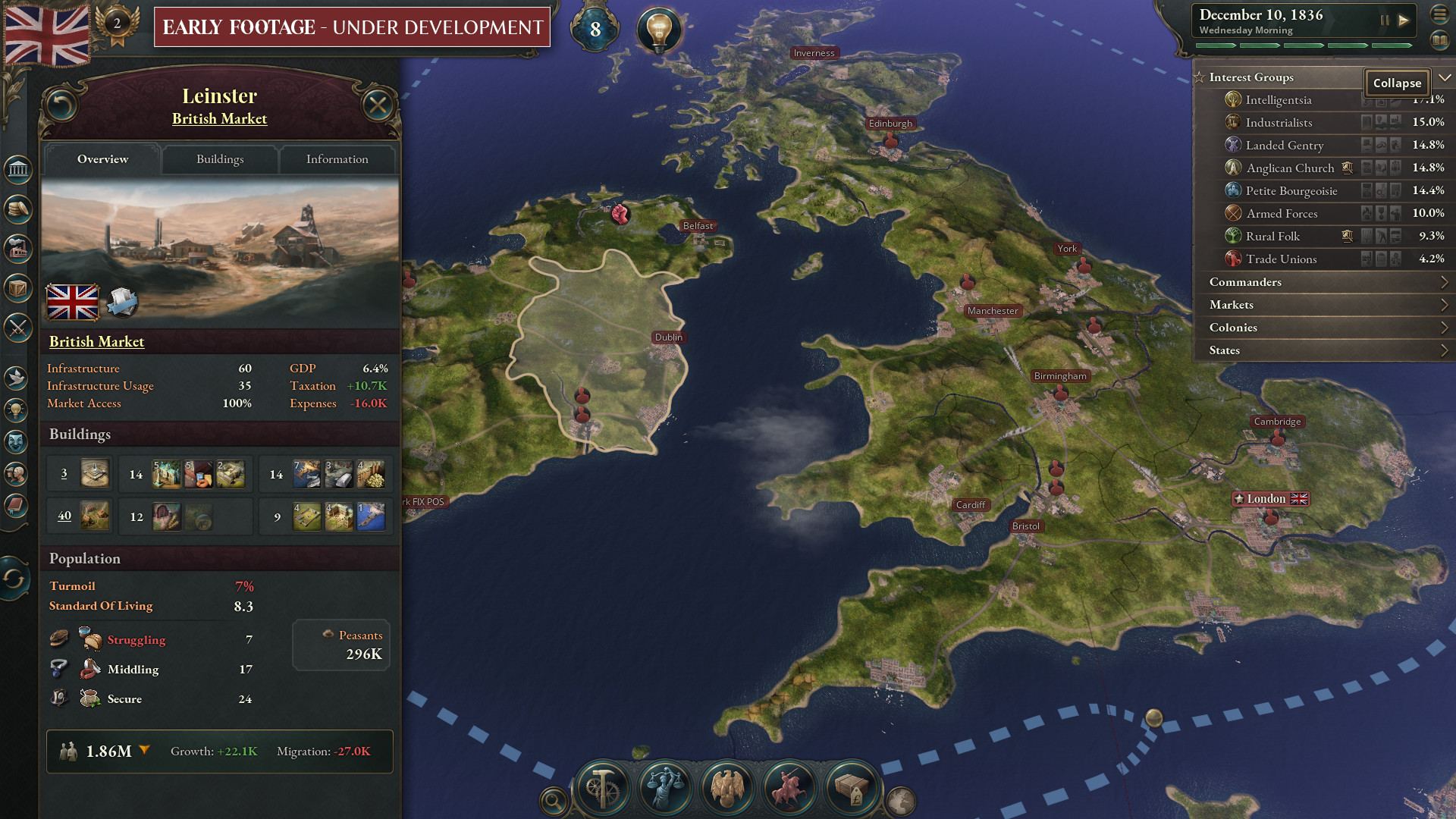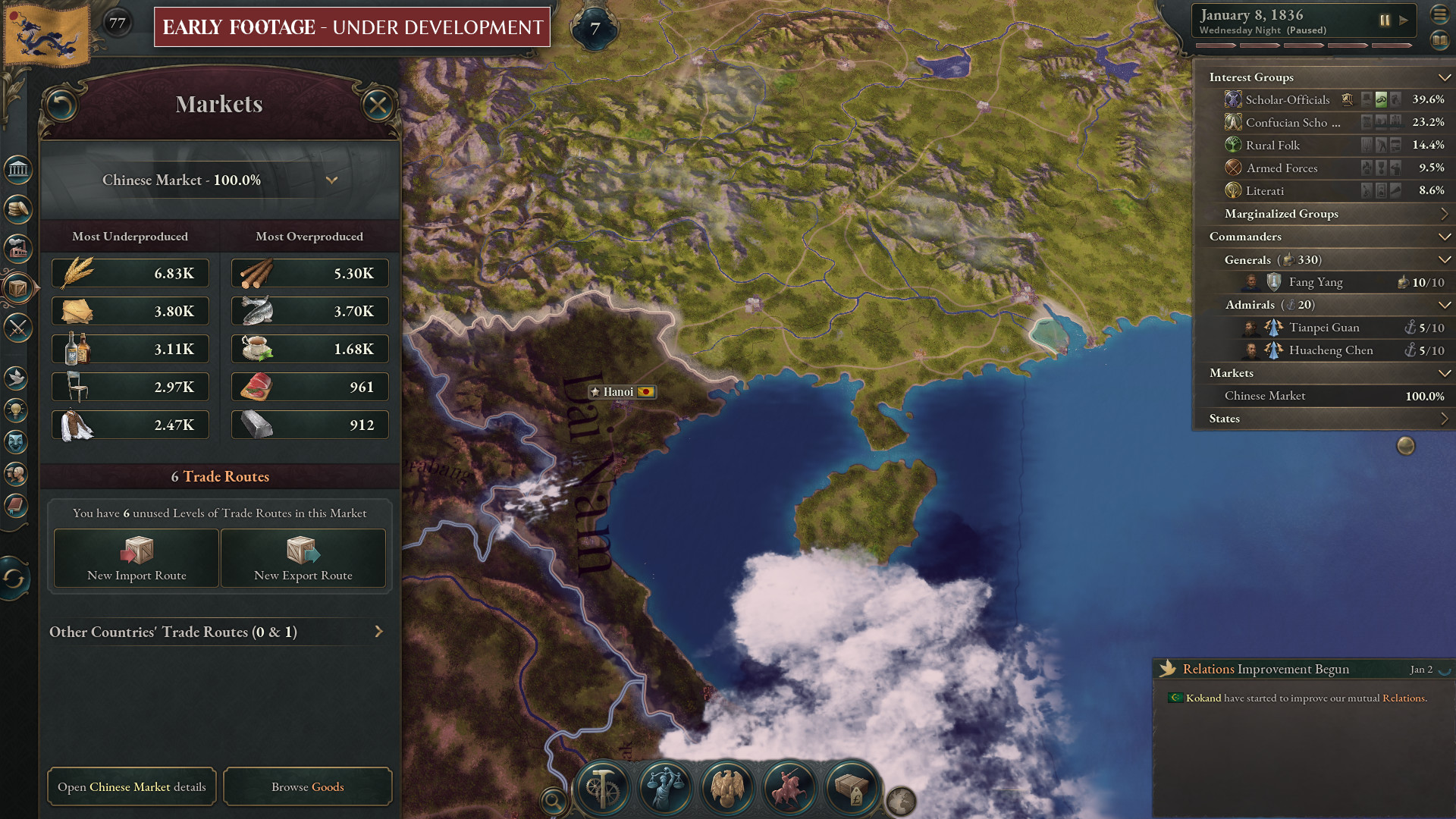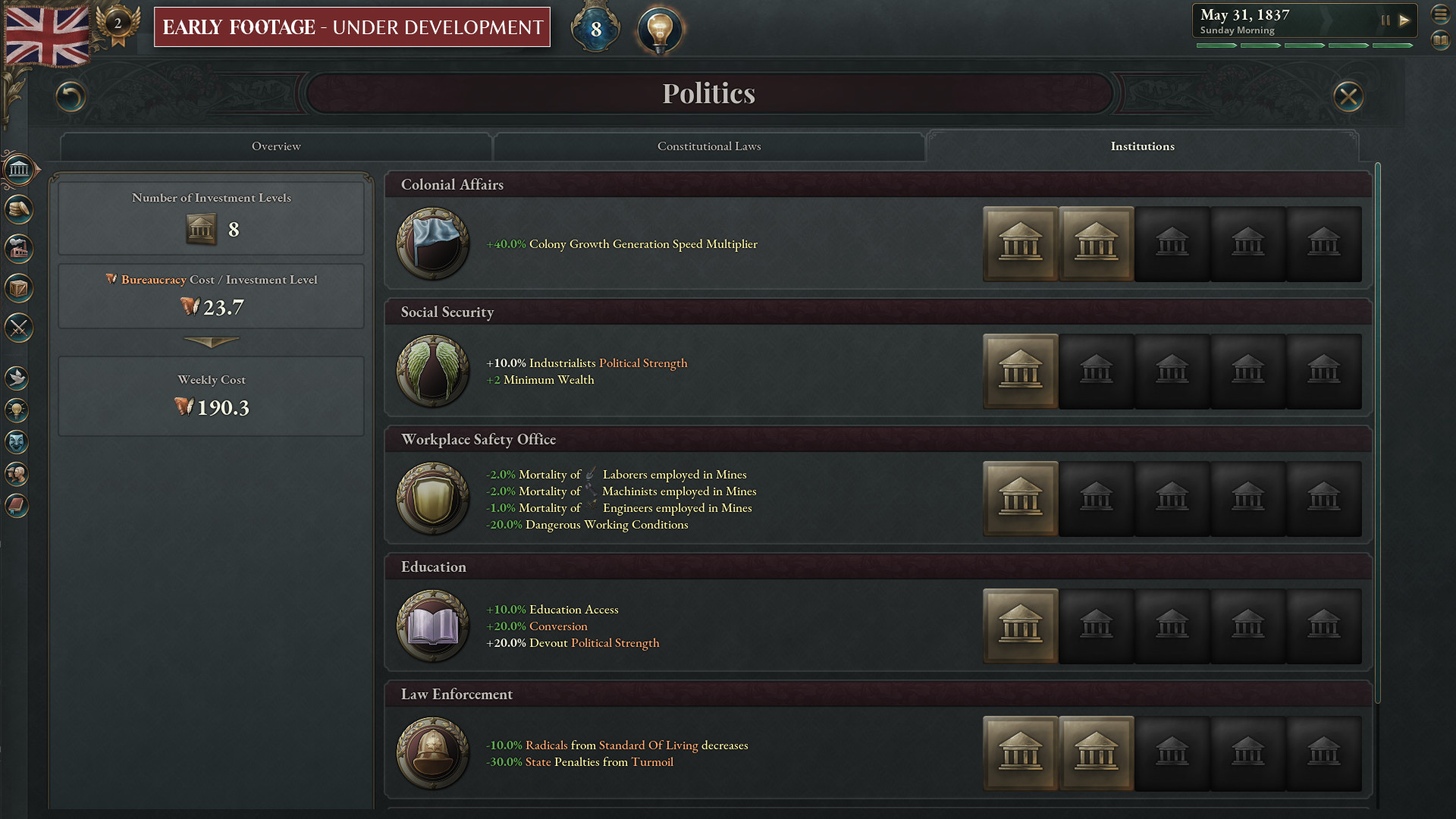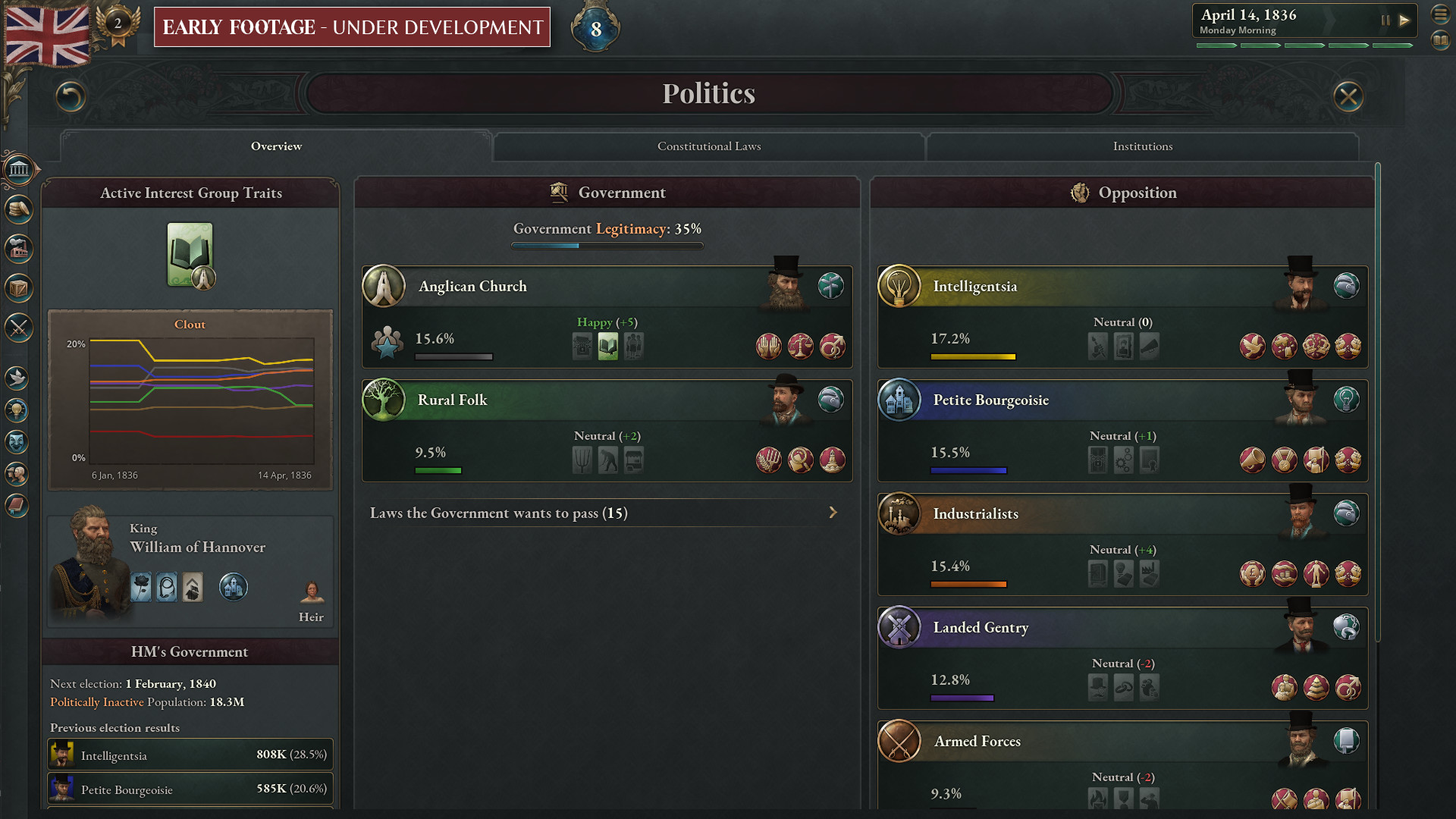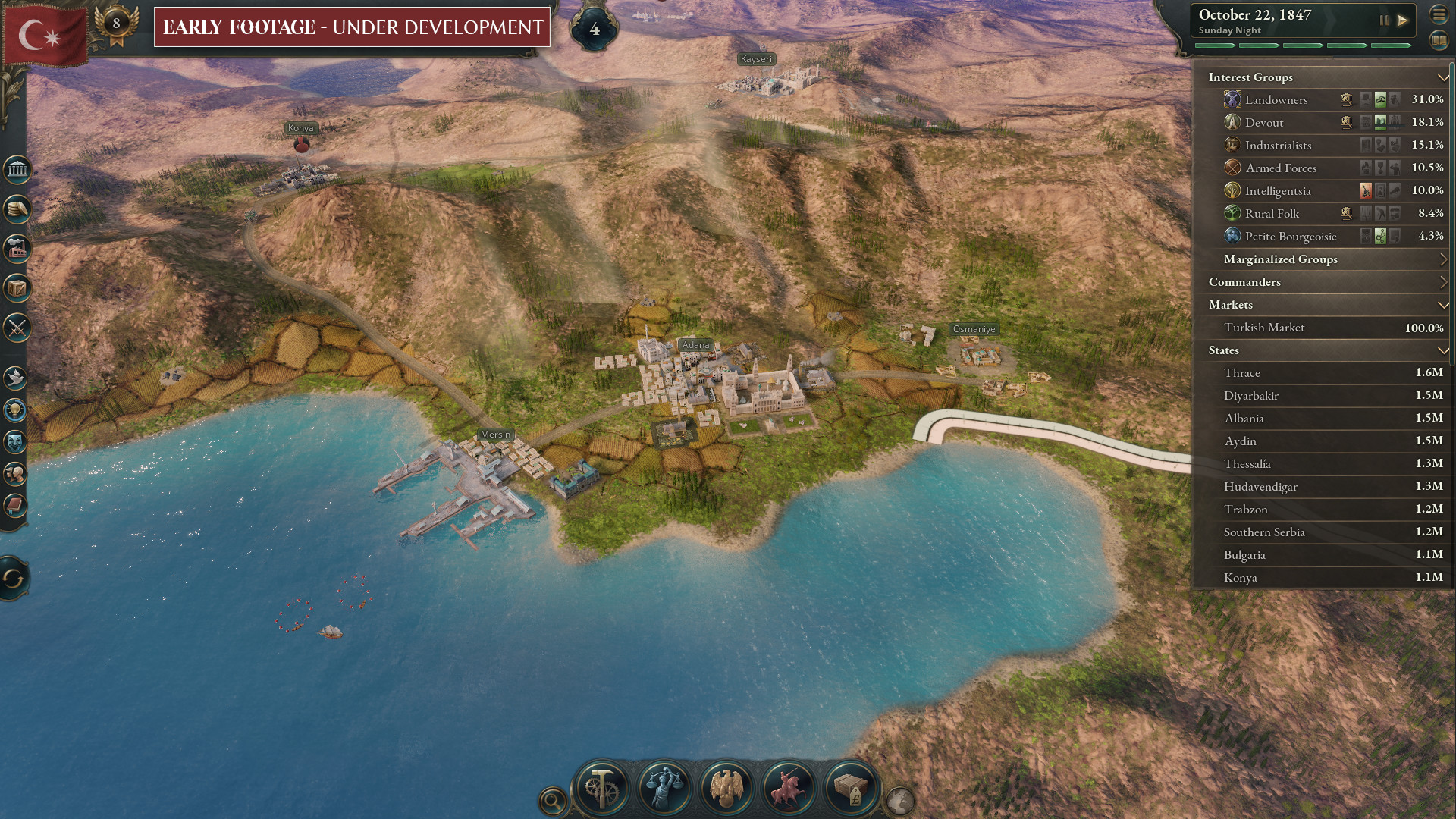SHAPE A GRAND TOMORROW
Paradox Development Studio invites you to build your ideal society in the tumult of the exciting and transformative 19th century. Balance the competing interests in your society and earn your place in the sun in Victoria 3, one of the most anticipated games in Paradox’s history.THE ULTIMATE SOCIETY SIMULATOR
- Lead dozens of world nations from 1836-1936. Agrarian or Industrial, Traditional or Radical, Peaceful or Expansionist... the choice is yours.
- Detailed population groups with their own economic needs and political desires.
- Reform your government and constitution to take advantage of new social innovations, or preserve the stability of your nation by holding fast to tradition in the face of revolutionaries.
- Research transformative new technology or ideas to improve your national situation.
DEEP ECONOMIC SYSTEM
- Expand your industry to take advantage of lucrative goods, taxing the profits to improve national prosperity.
- Import cheap raw materials to cover your basic needs while finding new markets for your finished goods.
- Secure vital goods to fuel your advanced economy and control the fate of empires.
- Balance employing available labor force with the needs for new types of workers.
PLAY ON A GRAND STAGE
- Use your diplomatic wiles to weave a tangled global web of pacts, relations, alliances, and rivalries to secure your diplomatic position on the world stage.
- Employ threats, military prowess and bluffs to persuade enemies to back down in conflicts.
- Increase your economic and military strength at the expense of rivals.
- Accumulate prestige and the respect of your rivals as you build an industrial giant at home or an empire abroad.

Good evening! Today we are finally ready to talk in detail about Political Parties. This has been a much-requested feature for Victoria 3, and indeed the political world would feel a little empty without the Whigs and Tories going at each others throats. Weve listened, and some months ago we revealed that we were indeed working on implementing this feature. Today we are ready to talk about how Parties will factor into the political landscape of the game.
In Victoria 3, a Political Party is an alliance between Interest Groups. They appear in countries that have Elections, and are absent in countries without them, differentiating the experience and mechanics of democracies from autocracies. Interest Groups must be added or removed from government as a single bloc, which means that youll need to make strategic decisions about the makeup of your government and deal with the consequences. The Liberal Party may for instance contain both the Intelligentsia and the Industrialists, who will both back your plans to move toward a free market economy but diverge on the issue of child labor. Sometimes an opposition Interest Group might decide that it wants to join a Party currently in government (or vice versa) - in this circumstance, the Interest Group will leave their old Party and be marked as wanting to join their new party. This wont force any Interest Group into or out of government, but if you decide to reform your government under these circumstances you must treat that Interest Group as being a member of the new Party, bringing them into or out of government as a single bloc.
The Republican Party in the USA is made up of an alliance between the Industrialists and the Intelligentsia, primarily opposing the ruling Democratic Party which is constituted by the Southern Planters and Petite Bourgeoisie.
Just as Parties ally together when you form your government, they also share their Momentum in Elections, which determines their votes. If for instance the fascist leader of the Petite Bourgeoisie joins the Conservative Party and is caught up in a political scandal, the whole Party suffers the electoral consequences. On the other hand, as the Landowners begin to lose their political relevance in an increasingly industrialized economy they might cling to relevance by attaching themselves to the rising Fascist Party, who may bring them Political Power from the votes the whole Party gains in the Election.
The Whig Party, consisting of a large number of opposition IGs, has landed themselves in a corruption scandal. Rowland Hill, leader of the Armed Forces and prominent Reformer, may have seriously harmed the entire blocs election campaign.
During the Election Campaign period (which as youll recall lasts 6 months before the final votes are cast), youre likely to get events relating to the various Partys campaign efforts that can have a major impact on Momentum. These events are inspired by the campaigns and scandals of the period, such as Gladstones Midlothian campaign and the whistle-stop tours that became popular in the USA.
There are 11 potential Political Parties that your Interest Groups can join. At any given time, any combination of these parties might exist or not exist. Parties emerge and disband dynamically, so the political landscape can be very different between countries and playthroughs. The following Parties can emerge throughout the course of the game:
- The Agrarian Party
- The Anarchist Society
- The Communist Party
- The Conservative Party
- The Fascist Party
- The Free Trade Party
- The Liberal Party
- The Military Party
- The Radical Party
- The Religious Party
- The Social Democratic Party
Many of these parties are aligned primarily around a particular Interest Groups core ideologies, which other IGs may join under the right circumstances. The Liberal Party for instance is the natural home of the Intelligentsia due to their Liberal Ideology, but they may be swayed towards other Parties under various circumstances. Other Parties are aligned more strongly with Leader Ideologies that emerge throughout the game, such as the Communist Party and the Radical Party. Each of these Parties has a variety of dynamic names based on national, cultural, and religious factors - for instance in Great Britain the Conservative Party is localized as the Tories, while in the USA they are known as the Democratic Party.
Interest Groups (IGs) may join a Political Party if they are not Marginalized and if their country has any of the Laws that allow Elections. Which Political Party an Interest Group will join is determined by a wide variety of factors, some of which Ill list here:
- IGs with the Republican, Reformer, Market Liberal, or Reformer Ideologies are much more likely to join the Liberal Party
- The Industrialists are more likely to be drawn towards the Conservative Party if the country has public healthcare or schools, or when voting laws allow the lower strata to vote.
- Weaker IGs might join the Agrarian Party alongside the Rural Folk in a push to abolish Serfdom. Scandinavian countries are much more likely to develop an Agrarian Party.
- In a Council Republic, IGs led by Anarchist leaders might leave the Communist Party if the countrys ruler is a Vanguardist.
- When an IG with a Fascist leader becomes powerful, weaker conservative IGs might join the Fascist Party in a bid to retain their political relevance.
- If a powerful IG has a Social Democratic leader, weaker leftist IGs may fall in line behind their more moderate cousins. Likewise, weaker Social Democrats might join a stronger Communist Party.
To summarize: in Victoria 3, Interest Groups band together into Political Parties for the purposes of elections and forming governments. There are many dynamic names and conditions that work to create plausible and flavourful Parties no matter which direction you choose to guide your country.
Thats all for today! Join us next week when Mikael will talk about the mechanics behind Religious Conversion and Cultural Assimilation.
Minimum Setup
- OS: TBC
- Processor: TBC
- Graphics: TBCSound Card: TBC
Recommended Setup
- OS: TBC
- Processor: TBC
- Graphics: TBCSound Card: TBC
[ 6374 ]
[ 5785 ]
[ 751 ]
[ 2194 ]

